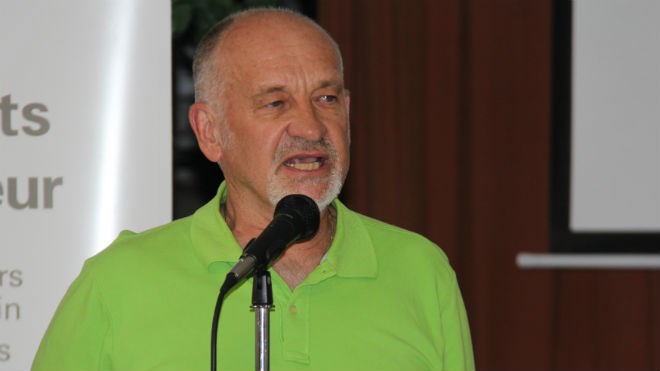Dr. Ed Najgebauer said he started thinking more about what happens at the end of life last year, when one of his patients told him the story of his father's death.
Despite the fact that the family had a living will stating the deceased's wishes not to be resuscitated, emergency personnel asked for a copy of a Do Not Resuscitate (DNR) form.
Because the family didn't have such a form, EMS said they were compelled to start cardiopulmonary resuscitation. When the family refused, the police were eventually called in.
A death in the family is stressful enough, involving the police just makes it that much more traumatic.
Beyond the issue of DNRs, people with terminal illnesses should have the option to turn to their doctors if they want to die, Najgebauer said.
And he's backing up his opinion with action. He recently joined the national group Dying With Dignity, which, among other things, supports medically-assisted dying if that's what a patient wants.
The doctor said there should be strict safeguards in place in such a situation, including the involvement of two or three physicians and waiting a significant period of time before carrying out the patient's wishes.
He said medically-assisted dying should also be restricted to those who have a terminal illness or are enduring unbearable suffering.
“It's quite simply back to that motto of Dying with Dignity — it's your life, it's your choice,” Najgebauer said. “The proper safeguards have to be put in place, and Dying with Dignity is very much in favour of all the safeguards.”
A law has recently been tabled in Quebec that would permit medically-assisted dying. It would be a Canadian first, but four states have "dying with dignity" legislation: Oregon, Washington, Montana and Vermont.
Najgebauer said he's not sure when the day will come that the practice would be allowed throughout the country, if it ever does.
He said there will have to be a significant groundswell of popular support before politicians pick up on the idea.
Najgebauer is a member of Dying With Dignity's advisory council of physicians, a group of 13 doctors from across the country who support the group's mission, which is to help people achieve quality in dying.
They're promoting the group's goals and helping it to review new policies, he said.
“Dying with Dignity is an organization that's trying to make people aware of their choices at the end of life,” Najgebauer said. “They're also trying to fight for increasing those choices.”
He said his patients and others who have heard about his involvement with Dying With Dignity have been quite supportive.
Najgebauer said he's in the process of organizing a public forum on the topic for the fall to raise more awareness, although he hasn't hammered out the details yet.
Past Dying with Dignity president Sheila Noyes said in a press release she's delighted with the group's new physician council.
“I have been involved in the right-to-die movement for over two decades,” she said. “For years, we sought a doctor who would be willing to sit on our board of directors.
“We've always had many who were members and supporters, but when it came to being a public face for the movement, they were simply under too much pressure to be willing to speak out.”
Beyond the right to medically assisted dying, end-of-life choices also include making sure people's health-care wishes are followed in the event of incapacitation, Najgebauer said.
One way to do that is through a written living will, he said.
Najgebauer brings up the case of a woman who signed a living will back in 1991 in which she asked not to be fed or given water if she developed an incapacitating, incurable disease.
This woman was diagnosed with dementia in 1999, and is now in a nursing home, where workers are feeding her.
“The family have now launched a lawsuit to try and force the nursing home to stop feeding her,” he said.
“The segue is Dying with Dignity would advocate for honouring the exact wishes that you specified in your living will. If you join Dying with Dignity, you get a end-of-life kit that allows you to think about your specific wishes.”
Najgebauer said there's a lack of awareness among the general public of the DNR form, which can be accessed online, (Google “DNR form Ontario”), and must be signed by a doctor, nurse practitioner, registered nurse or registered practical nurse.
More than that, though, the health-care system seems to be set up for medical interventions, even when they're no longer appropriate.
“Again, the natural process is no CPR, and all of these things are interventions that people think are just fine,” Najgebauer said.
For more information about Dying With Dignity, visit dyingwithdignity.ca.
Join Sudbury.com+
- Messages
- Post a Listing
- Your Listings
- Your Profile
- Your Subscriptions
- Your Likes
- Your Business
- Support Local News
- Payment History
Sudbury.com+ members
Already a +member?
Not a +member?
Sign up for a Sudbury.com+ account for instant access to upcoming contests, local offers, auctions and so much more.
